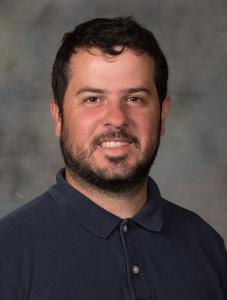Posted June 30, 2017 by Tiffany Lee
This is the final Q&A in a three-part series focused on how faculty can benefit from meeting with program officers in Washington, D.C. Previously, Ana María Vélez talked about preparing for her meetings and tips she received. Ashraf Aly Hassan shared how he recast a proposal to better fit program objectives at the National Science Foundation. This month, Marc Goodrich discusses how he’s been putting into action the tips he received from the National Institutes of Health and the Institute of Education Sciences, part of the U.S. Department of Education. All three University of Nebraska-Lincoln faculty traveled to D.C. in March.
Goodrich is an assistant professor of special education and communication disorders and a member of the 2016-2017 class of the Research Development Fellows Program. His research focuses on language development and literacy skills among children in the U.S. who speak a language other than English at home, particularly native Spanish speakers.
ORED: What did you expect heading into the meetings in D.C.?
Goodrich: RDFP fellows are encouraged to meet with program officers and pitch ideas to evaluate the fit of a project with various agencies or programs. I was hoping to get face time with program officers and receive feedback about whether certain programs are a good fit.
ORED: What did you learn?
Goodrich: I got very different feedback from both agencies, and both were helpful. At NIH, specifically the National Institute of Child Health and Human Development, I learned my project was not a good fit because it did not align with NIH’s big-picture goal – improved public health outcomes. The concept paper I drafted for the meeting was focused on academic outcomes. As I prepare my proposal for October submission, I am putting a different spin on it by focusing on public health outcomes rather than education.
At IES, I received more specific feedback about different ways to conceptualize the project, and components to add to the project to make it more competitive. I learned what type of team to put together and what research questions to add.
ORED: What was the most valuable piece of advice you received?
Goodrich: The most important guidance I received was to assemble a team that compensates for my weaknesses as an early-career faculty member who doesn’t have experience with obtaining or executing a large award. My co-investigators should have received funding from the agency I’m applying to, and they need to have successfully executed a project. If I propose a methodology I don’t have expertise in, I need a collaborator who has that expertise. I need to ensure my proposal doesn’t get thrown out because the review panel thinks I’m incapable of executing the project.
ORED: Since coming back, how have you implemented the advice you received?
Goodrich: For NIH, I’ve been seeking out different collaborators to assemble a team that I didn’t initially think I would need. For IES, I originally pitched a project focused on how language skills are related to reading comprehension among Spanish-speaking English language learners. At the program officer’s advice, I am now incorporating a second phase involving small-scale experimentation.
ORED: What would you say to faculty members considering a trip to D.C.?
Goodrich: I would definitely encourage it. It can be a nerve-wracking experience – I was definitely nervous. But the experience was valuable. I got very specific feedback about what to do at each agency to ensure a competitive submission, including specific ideas from program officers about the type of content to include. Also, I found out IES sometimes reviews proposals for applicants prior to the deadline, which I wasn’t aware of. You receive different information when talking to program officers versus reading solicitations.
For more information about resources available to faculty to support sponsor engagement and proposal development, contact Tisha Mullen, director of proposal development, at 402-472-2894. Visit Faculty Travel Awards to request funds to help defray the costs of travel to visit funding agencies.






